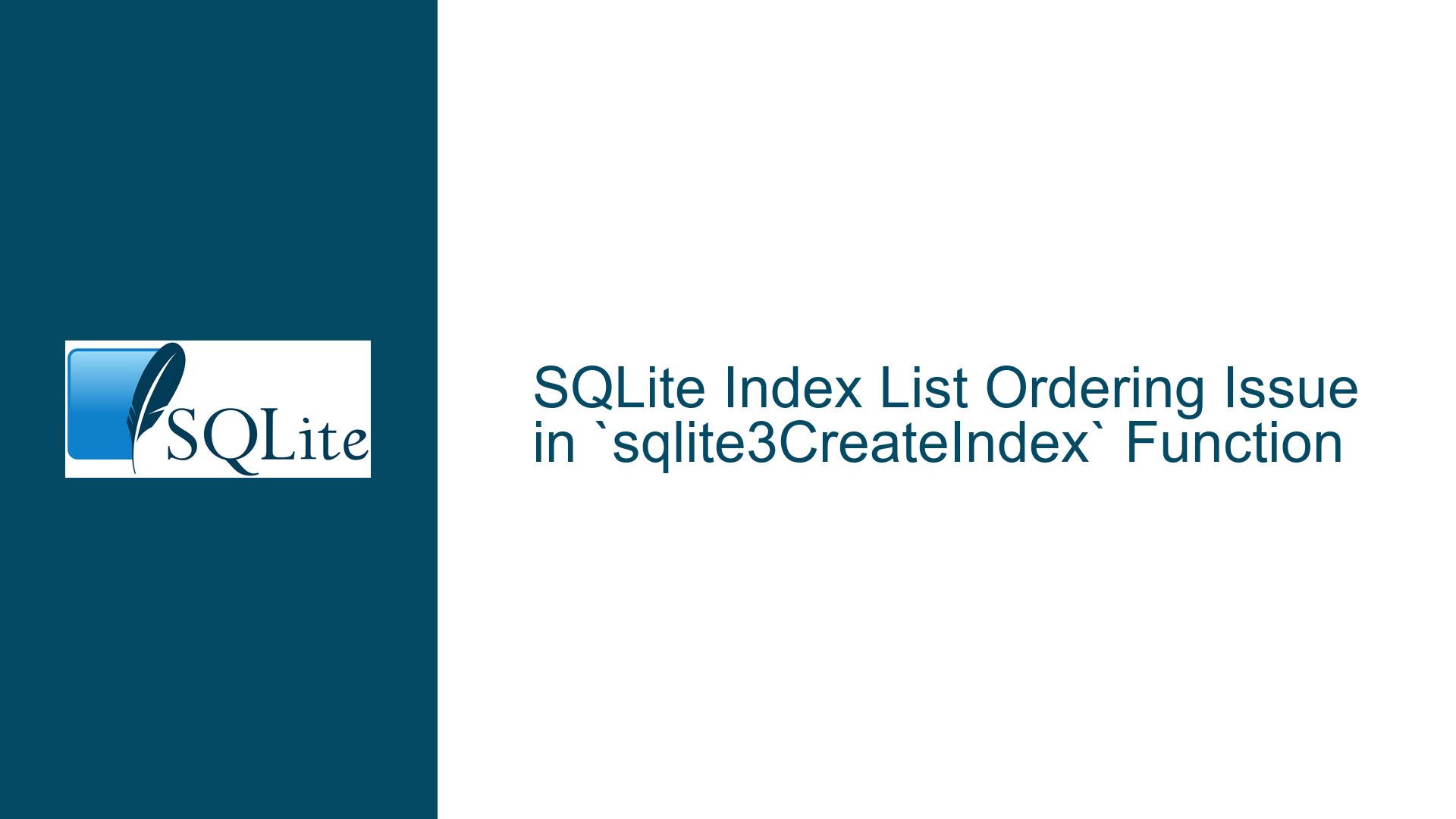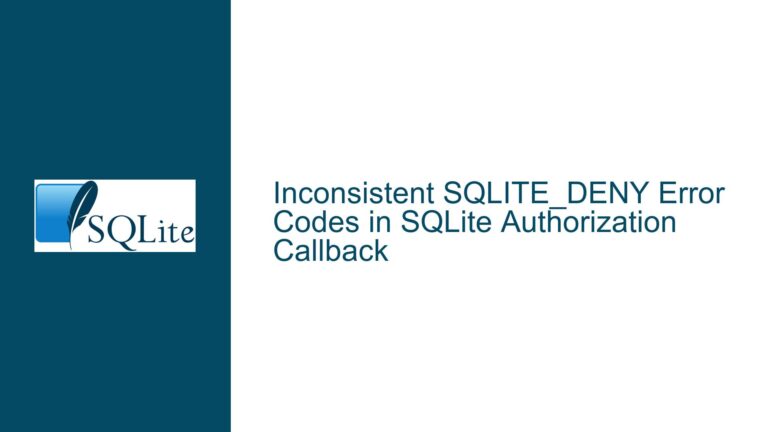SQLite Index List Ordering Issue in `sqlite3CreateIndex` Function
Incorrect REPLACE Index Positioning in sqlite3CreateIndex
The core issue revolves around the behavior of the sqlite3CreateIndex function in SQLite, specifically how it handles the ordering of indexes with the onError=OE_Replace property. The function is designed to ensure that all indexes with the OE_Replace conflict resolution strategy are moved to the end of the index list. However, the implementation does not fully achieve this goal due to a logical flaw in the code. This flaw can lead to incorrect ordering of indexes, which may affect the behavior of conflict resolution during database operations.
The problem manifests in the following way: when the function iterates through the list of indexes, it attempts to move OE_Replace indexes to the end. However, the loop terminates prematurely after encountering the first OE_Replace index and moving it to the end. This means that if there are multiple OE_Replace indexes in the list, only the first one encountered is moved, while the others remain in their original positions. This behavior contradicts the intended functionality described in the comment, which states that "all REPLACE indexes are at the end of the list."
The issue is particularly significant because the order of indexes can influence how SQLite resolves conflicts during insert or update operations. If OE_Replace indexes are not consistently positioned at the end of the list, the conflict resolution behavior may become unpredictable, leading to potential data integrity issues.
Premature Loop Termination in Index Reordering Logic
The root cause of the issue lies in the premature termination of the loop responsible for reordering the indexes. The original code uses a break statement after moving the first OE_Replace index to the end of the list. This break statement causes the loop to exit early, preventing the function from processing any subsequent OE_Replace indexes. As a result, only the first OE_Replace index is moved, while the rest remain in their original positions.
The logic flaw can be traced to the following section of the code:
if( pTab ){ /* Ensure all REPLACE indexes are at the end of the list */
Index **ppFrom = &pTab->pIndex;
Index *pThis;
for(ppFrom=&pTab->pIndex; (pThis = *ppFrom)!=0; ppFrom=&pThis->pNext){
Index *pNext;
if( pThis->onError!=OE_Replace ) continue;
while( (pNext = pThis->pNext)!=0 && pNext->onError!=OE_Replace ){
*ppFrom = pNext;
pThis->pNext = pNext->pNext;
pNext->pNext = pThis;
ppFrom = &pNext->pNext;
}
break;
}
}
In this code, the break statement is executed immediately after the inner while loop completes its first iteration. This means that the outer for loop does not continue iterating through the remaining indexes, leaving any additional OE_Replace indexes unprocessed.
The proposed fix addresses this issue by removing the premature break statement and modifying the logic to ensure that all OE_Replace indexes are moved to the end of the list. The corrected code uses a nested loop structure to iterate through the list and move each OE_Replace index to the end, ensuring that the final list order is consistent with the intended behavior.
Correcting Index Reordering Logic and Ensuring Consistent Behavior
To resolve the issue, the code must be modified to ensure that all OE_Replace indexes are moved to the end of the list. The proposed fix involves restructuring the loop logic to avoid premature termination and to handle multiple OE_Replace indexes correctly. The corrected code is as follows:
if( pTab ){ /* Ensure all REPLACE indexes are at the end of the list */
Index **ppFrom = &pTab->pIndex;
Index *pThis;
for(ppFrom=&pTab->pIndex; (pThis = *ppFrom)!=0; ppFrom=&pThis->pNext){
Index *pNext;
Index *pTail = pThis;
if( pThis->onError!=OE_Replace ) continue;
while( (pNext = pThis->pNext)!=0 ){
if (pNext->onError!=OE_Replace) {
*ppFrom = pNext;
pThis->pNext = pNext->pNext;
pNext->pNext = pTail;
ppFrom = &pNext->pNext;
} else {
pThis = pNext;
}
}
}
}
In this corrected version, the break statement has been removed, allowing the outer loop to continue iterating through the list. The inner loop now correctly handles the reordering of OE_Replace indexes by moving each one to the end of the list. The use of the pTail variable ensures that the indexes are appended to the end of the list in the correct order.
The corrected logic ensures that all OE_Replace indexes are moved to the end of the list, regardless of their initial positions. This change aligns the behavior of the sqlite3CreateIndex function with the intended functionality described in the comment, ensuring consistent and predictable conflict resolution behavior during database operations.
To further validate the fix, it is recommended to test the modified code with a variety of index configurations, including cases with multiple OE_Replace indexes. This testing should confirm that the indexes are correctly reordered and that the conflict resolution behavior is consistent with expectations.
In addition to the code fix, it is important to update the associated comment to accurately reflect the behavior of the function. The updated comment should clearly state that all OE_Replace indexes are moved to the end of the list, ensuring that future developers understand the intended functionality.
By addressing the issue and implementing the corrected logic, the sqlite3CreateIndex function will consistently order indexes as intended, preventing potential data integrity issues and ensuring reliable conflict resolution behavior in SQLite databases.






